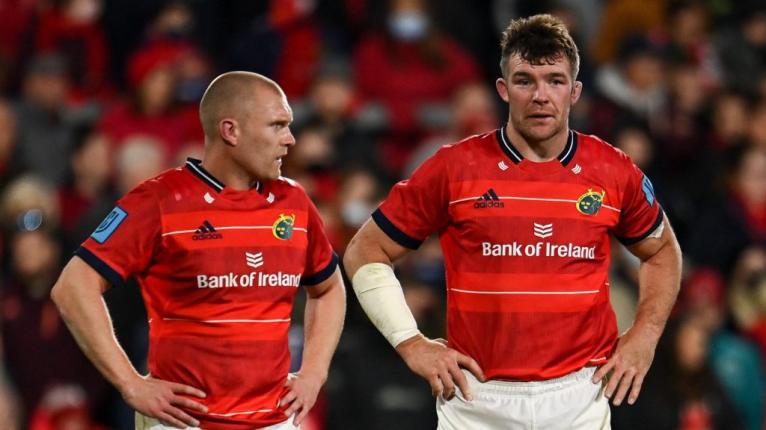You think you know a person. You see him on your screens and know his work from the world’s biggest and best rugby stadiums. You see the stats that measure his playing credentials – 96 caps, 34 tries – a scoring record beaten by just one man in Irish rugby history. Brian O’Driscoll is the name of the other guy.
The feller we’re talking about here is Keith Earls. Say his name silently and your mind will conjure up different images, like the lung-busting burst he took last March when he seized Jack Conan’s pass before abruptly changing direction to move into a space no England player was near. That try changed the game and possibly the direction of Andy Farrell’s career. After it, the Ireland coach spoke about the depth of his winger’s intelligence.
Earls didn’t feel smart as a teenager. A teacher scolded him one day, telling him he’d never amount to anything in life. That rebuke simultaneously left a scar and a motivation. He has been proving that person wrong ever since, most recently last week when his autobiography won Ireland’s sports book of the year.
“As good as anything I’ve won,” he said of the award. But a bigger prize lay on the table next to him. It was a letter from a young male, who wrote to say he had listened to Earls’ revelation about his bipolar disorder and has subsequently sought professional help. “That’s why I did it (the book),” says Earls. “It wasn’t for me; it was to help others. The response, I’ll be honest, I’ve kind of been blown away by it.”
He shouldn’t be surprised. Long before he had contemplated writing his memoir, Earls was considered one of Ireland’s most popular sportsmen, not just for how he played – with bravery, instinct and skill – and not just for his humble demeanour but also because of where he’s from.
So much good is in there, people looking out for others; I hated it when outsiders spoke badly of it. We have a great community. You’ve great values in Moyross. It shaped me to become the man I am.
Keith Earls
Over the past 20 years, rugby’s popularity has exploded in Ireland, crossing beyond its own self-imposed boundaries. Yet while the game has been winning new hearts and minds, its playing base was still largely drawn from a small number of private fee-paying schools in middle-class Irish society.
In contrast, Earls is a boy from Moyross, the large housing estate in Limerick city. There was a time, earlier this century, when the area had a bad name, an unfair slight if ever there was one. It’s a fine place where there’s always life from dawn to dusk, the roar of car engines moving in and out, of teenagers laughing, of kids playing. Earls’ pride in his home is evident. “So much good is in there, people looking out for others; I hated it when outsiders spoke badly of it. We have a great community. You’ve great values in Moyross. It shaped me to become the man I am,” he says.

This isn’t a story without complications, though. As a teenager he once saw a man in a balaclava fire a shot on the street he grew up in; another time he witnessed a stabbing. “You try to numb these things out,” he says, but ultimately it fed into his anxiety. His father, Ger Earls, the outstanding Irish flanker of his generation who scandalously never received an international cap, often used to persuade his son to change his clothes: “No hoodies; no baseball hats, Keith.” Thereby there was no chance of being mistaken for someone else.
Growing up, there were tragedies. A cousin died in a car accident and Earls subsequently encountered panic attacks while travelling. He lost a friend to suicide, another in a drowning accident. It all had a huge impact. He became superstitious, carrying rosary beads with him wherever he went, having a night-time ritual where he’d kiss the mortuary cards of loved ones he’d lost. He possessed a deepness most teenagers don’t feel.
And there was also an underlying pain. It wasn’t until 2013 when he was diagnosed with a bipolar disorder. Anxiety, panic attacks, depression, they all became unwelcome companions. He wrote in his book how he had a friend who lived in his head, a person he called ‘Hank’ – after the character in the Jim Carrey film, ‘Me, Myself and Irene’. “Some days I was in great form; that was when I was Keith; some days I was in a horrible mood. That was Hank.”
It took years for him to understand Hank, to understand himself. “I have won 96 caps for Ireland,” he says, “but to be honest I didn’t enjoy any of the first 50. It was not until after my 30th birthday that I started to like it (playing for Ireland).”

Joe Schmidt played a significant role in the turnaround, the strict headmaster-type realising he had to speak differently to Earls than everyone else. His team-mates nicknamed him the teacher’s pet because of his closeness to the coach, yet despite their vastly different backgrounds, the two men share many similarities: a drive to succeed and an intolerance of low standards.
A lot of people give out about Roy Keane but he has the same thing that Joe Schmidt has, a demand for excellence.
Keith Earls
In his own autobiography, Schmidt identified Earls as an authentic leader, a person who doesn’t need a textbook to tell him how to inspire others. Similar things have been said about Roy Keane, one of Earls’ childhood heroes.
“Where Keane is from in Cork is not too different to where I came from in Limerick. I could relate to that,” says Earls. “The standard he set… look, a lot of people give out about Roy Keane but he has the same thing that Joe Schmidt has, a demand for excellence. He had that mentality to win and not give a shit about where he was from or who he was up against. He was incredible. I hold him in high regard.”
For someone who suffered from a lack of self-confidence in his youth, Earls was able to see, via Keane, that it was possible to journey from working-class estate to sport’s peak. He started to understand that these cream-coloured houses he and his friends grew up in doubled up as cottage industries, generations of footballers and rugby players emerging through its doors with a ball at their feet and a dream in their head: “Well, if a lad from Cork can make it, I can too.”

It hurts that his father wasn’t capped by Ireland. He dedicates a chapter to his parents, saying how less talented players got picked for their country ahead of Munster’s Ger Earls. “Dad didn’t look like your typical Irish rugby player. He had tattoos. He didn’t have an office job. He worked with his hands. He just didn’t fit the bill,” he says.
I want people to know that there are choices, that you can get help. Life is tough and there will be good days or bad days. But you can get better.
Keith Earls
Times change. These days, Ireland are coached by a working-class Lancastrian. Rugby has much more of an everyman feel to it than it used to. It helps, of course, the Ireland team are winning again, beating New Zealand last month. “We are trying to get to where we were in 2018 again; the big thing for us is to get some consistency. Talking to people, to supporters they are loving it; the way we are trying to play. The challenge for us now is repeat November’s performances,” says Earls.
Think of everything Munster’s winger has overcome, the damaging slight of a teacher; the mental torment of his condition and also, from 2017 to 2020, a debilitating liver issue that drastically reduced his capacity to breathe. At one point, in September 2020, he told the Munster coach, Johann van Graan, that he was set to retire. Two months later, he saw a liver specialist in London and the problem was resolved. “I feel better now than I did when I was 30,” he says.
That doesn’t just apply to his body. In his head, he is also in a much better place, the positive public reaction to his revelations easing a concern in his mind.
“I want people to know that there are choices, that you can get help. Life is tough and there will be good days or bad days. But you can get better,” he says.
He is living proof.
“I’m winning the battle,” he says.
Everyone in Ireland is in his corner.
‘Fight or Flight, My life, My Choices’, Keith Earls with Tommy Conlon by Reach Sport.



Comments
Join free and tell us what you really think!
Sign up for free